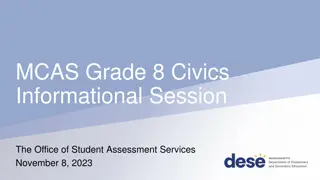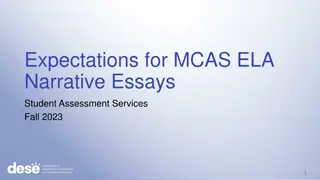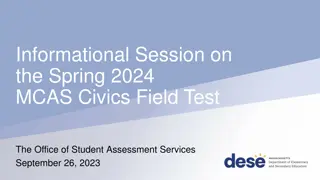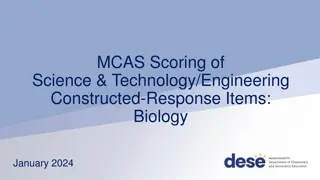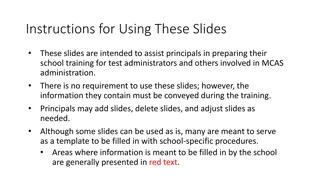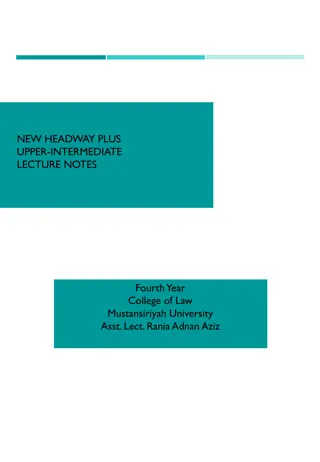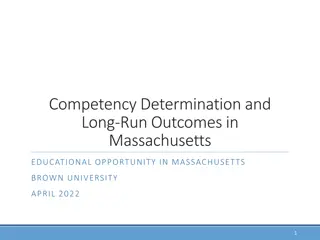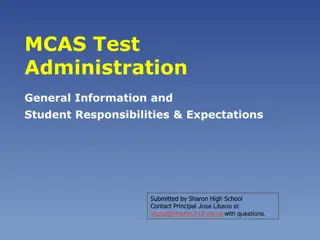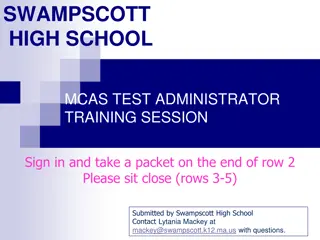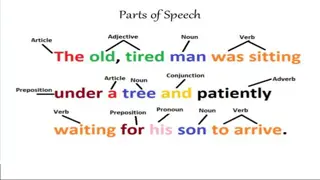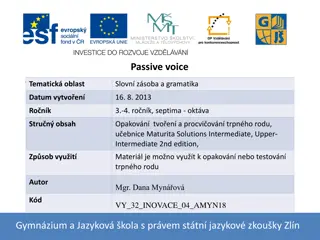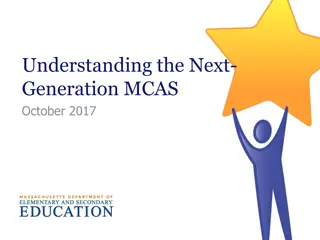Evolution of MCAS: Past, Present, and Future
The evolution of MCAS began with the McDuffy v. Secretary of Education decision in June 1993, setting constitutional standards for education reform efforts in Massachusetts. The case highlighted the state's failure to meet its obligation to support public schools. Subsequently, the Massachusetts Education Reform Act of June 1993 established high standards, a statewide assessment system, and school accountability measures. The Act also reformed the school finance system to ensure equal resources for all districts.
Download Presentation

Please find below an Image/Link to download the presentation.
The content on the website is provided AS IS for your information and personal use only. It may not be sold, licensed, or shared on other websites without obtaining consent from the author.If you encounter any issues during the download, it is possible that the publisher has removed the file from their server.
You are allowed to download the files provided on this website for personal or commercial use, subject to the condition that they are used lawfully. All files are the property of their respective owners.
The content on the website is provided AS IS for your information and personal use only. It may not be sold, licensed, or shared on other websites without obtaining consent from the author.
E N D
Presentation Transcript
Historical Overview of MCAS: where it started, where we have been, and where we are going September 19, 2023 1
Where it started: McDuffyv. Secretary of Education - June 1993 McDuffy decision established the state constitutional standards against which education reform efforts in Massachusetts would be judged SJC held that the Commonwealth had failed to meet its constitutional obligation to cherish the public schools and grammar schools in the towns. Mass. Const., pt. II, ch. V, II , citing, among other things, the Report of the Committee on Distressed School Systems and School Reform published by the Massachusetts Board of Education in 1991. 2
Where it started: McDuffyv. Secretary of Education - June 1993 The court stated that [a]n educated child must possess 'at least the seven following capabilities: (i) sufficient oral and written communication skills to enable students to function in a complex and rapidly changing civilization; (ii) sufficient knowledge of economic, social, and political systems to enable students to make informed choices; (iii) sufficient understanding of governmental processes to enable the student to understand the issues that affect his or her community, state, and nation; (iv) sufficient self-knowledge and knowledge of his or her mental and physical wellness; (v) sufficient grounding in the arts to enable each student to appreciate his or her cultural and historical heritage; (vi) sufficient training or preparation for advanced training in either academic or vocational fields so as to enable each child to choose and pursue life work intelligently; and (vii) sufficient level of academic or vocational skills to enable public school students to compete favorably with their counterparts in surrounding states, in academics or in the job market.' 3
Where it started: Massachusetts Education Reform Act - June 1993 At its most basic level, the Education Reform Act required the following elements: the establishment of high standards that each student would be expected to meet a statewide assessment system to measure progress an accountability system to hold schools and districts responsible for progress in meeting the new standards the establishment of the competency determination a new school finance system designed to make available an adequate level of resources to each school district irrespective of each community s fiscal capacity 4
Where we were: NAEP achievement in 1990s MA MA MA Math G4 rank* 7 6 Reading G4 Rank* 3 4 MA Math G8 rank* Reading G8 Rank* 1992 NAEP 1996 NAEP 1998 NAEP 12 4 *Ordinal rank of state scores 5
MCAS debuts in 1998 MCAS first administered in 1998 after development time and field testing Administered in grades 4, 8, and 10 Students Included (#) Grade and Subject Proficient or Higher Warning/ Failing Average Raw/ Scaled Score Advanced Proficient Needs Improvement STATE STATE STATE STATE STATE STATE 20 1 19 66 15 230 74,452 GRADE 04 - ENGLISH LANGUAGE ARTS 34 11 23 44 23 234 75,235 GRADE 04 - MATHEMATICS 48 6 42 40 12 238 75,230 GRADE 04 - SCIENCE AND TECH/ENG 55 3 52 31 14 237 68,486 GRADE 08 - ENGLISH LANGUAGE ARTS 31 8 23 26 42 227 69,014 GRADE 08 - MATHEMATICS 28 2 26 31 41 225 68,995 GRADE 08 - SCIENCE AND TECH/ENG 38 5 33 34 28 230 60,857 GRADE 10 - ENGLISH LANGUAGE ARTS 24 7 17 24 52 222 61,430 GRADE 10 - MATHEMATICS 22 1 21 42 36 225 61,437 GRADE 10 - SCIENCE AND TECH/ENG 6
7 Where have we been: historical ELA MCAS data 7
Important Milestones Class of 2003 first class with competency determination requirement in ELA and Math Class of 2010 STE added to the Competency Determination and threshold for ELA and Math raised 2010 Introduction of growth model 2017 development of fully computer-based, Next-Generation MCAS for grades 3-8 2019 first year of Next-Generation MCAS for grade 10 ELA and Math 2022 Next-generation tests in HS Science administered (delayed by pandemic) 2022 CD threshold raised for class of 2026 including parental notification of EPP and improved DESE communication around CD appeals process 9
Graduation rates at an all-time high 4-year Graduation Rate 2006-2022 100 95 90.1 89.8 89.0 90 88.3 88.0 87.8 87.5 87.3 86.1 85.0 84.7 85 83.4 82.1 81.5 81.2 80.9 79.9 80 75 70 2006 2007 2008 2009 2010 2011 2012 2013 2014 2015 2016 2017 2018 2019 2020 2021 2022 10
Dropout rates decreased since MCAS began Annual Droput Rate 1994-2022 7.0 6.0 5.0 4.6 4.4 3.8 3.8 3.7 4.0 3.6 3.5 3.5 3.4 3.4 3.4 3.4 3.3 3.3 3.1 2.9 2.9 2.9 2.7 3.0 2.2 2.1 2.0 1.9 1.9 1.9 1.8 1.8 2.0 1.6 1.5 1.0 0.0 94 95 96 97 98 99 00 01 02 03 04 05 06 07 08 09 10 11 12 13 14 15 16 17 18 19 20 21 22 11
Why are these data important? MCAS scores remain the only consistent measure of student achievement in Massachusetts to identify both strengths and challenges Allows for targeted resource allocation and not guessing MCAS scores reflect likelihood for future earning success in the labor market 12
Why are these data important? Research done by Learning Heroes in 2018 indicated a disconnect in parent perception of their child s achievement 88% of Massachusetts parents report that their child is at or above grade level in math. In reality, 48% of Massachusetts students in grades 3-8 were at or above grade level in math in 2018. 88% of Massachusetts parents report that their child is at or above grade level in reading. In reality, 51% of Massachusetts students in grades 3-8 were at or above grade level in 2018. 13
Where are we going? Full integration of computer-based, Next-Generation MCAS with new procurement ongoing and expected to be awarded in fall 2023 Procurement requirements maintain strengths of program and propose changes to some areas 14
Educator Involvement in MCAS Strong and ongoing participation by educators is a hallmark of the MCAS program 265 educators annually(475 unique members since 2017) review and provide feedback on test items at multiple points in the development process, serving as: Assessment development committee members Bias and sensitivity committee members Expert reviewers 280 educators participated on standard setting panels between 2017 and 2022, providing their expertise in determining what students should know and be able to do at each achievement level 15
Proposed Changes New Science Assessment Move toward replacing current science tests in grades 5 and 8 with new science assessment that encourage the doing of science Groups of questions linked into storylines that have more real-world purpose, show diverse students and adults working on science, and include an interactive simulation so students can do experiments, collect data or conduct observations. Timeline FY24 Field test FY25 Field test FY26 - Operational 16
Proposed Changes New Civics Assessment Implement civics assessment in grade 8 Multiple, interrelated components designed to balance testing time, content representation, and the measurement of deeper learning; measuring students understanding of civics and the foundations of the Massachusetts and U.S. governments Timeline FY24 Field test FY25 - Operational 17
Proposed Changes Improved access Provide translated versions of the assessments in additional grades and additional languages Currently offer Spanish tests in math and science at high school Proposed Offer Spanish in grades 3-8 in math and science Potentially phase in additional languages for grades 3-8 and HS math and science 18
Proposed Changes Return of Results Improve turnaround times Increase use of automated scoring to provide results back more quickly Consider rolling return of results to parents by eliciting proposals for online portal/mobile site Provide connections to other resources and information Improve resources around uses and interpretation of results 19
Proposed Changes Testing Time Average testing time in grades 3-8 is around 7 hours for ELA and Math and 9 hours with Science (~1% of required instructional hours) ELA accounts for about 4 hours Implement revisions to ELA test to continue to bring down the amount of time spent on testing Reduction in number of essays Introduction of standalone items to test language standards 20







